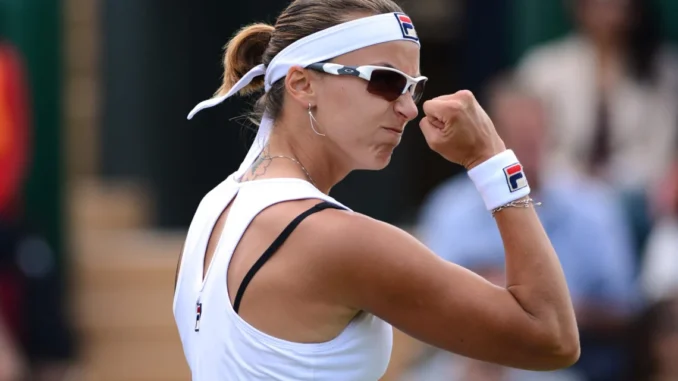
Flawless Glory: The Untouchable Set That Shook Wimbledon 13 Years Ago…Read More…
Thirteen years ago, under the bright sun and watchful eyes of Centre Court spectators, a moment of perfection unfolded that remains etched in tennis history. A young, focused competitor didn’t just win a set—she dominated it in a way never seen before at Wimbledon. Without conceding a single point, she achieved a “golden set,” a rare feat so statistically improbable it borders on mythical. That player? Yaroslava Shvedova.
At the time, the tennis world was already familiar with the term “golden set”—winning a set 6–0 without losing a single point—but to see it happen on the grand grass courts of Wimbledon was unprecedented. It was July 2012, and Kazakhstan’s Yaroslava Shvedova was facing Italian veteran Sara Errani in the third round of the tournament. Errani, then ranked No. 10 in the world, was fresh off a runner-up finish at the French Open and expected to roll deep into the second week of Wimbledon.
But in a staggering display of precision, aggression, and unyielding focus, Shvedova rewrote expectations and record books. In just 15 electrifying minutes, she won the first set 6–0—without losing a single point. Every serve she launched was unreturnable. Every return she delivered was perfectly placed. Every rally ended with her winning shot. By the time the crowd fully realized what they were witnessing, it was over: 24 points played, 24 points won.
The Rarity of the Golden Set
The golden set is the tennis equivalent of a perfect game in baseball or a 147 break in snooker—nearly impossible under normal competitive conditions. To date, only a tiny handful of professional players have ever achieved one, and most were in lower-level matches or qualifying rounds. Shvedova’s golden set at Wimbledon, however, remains the only instance it has ever occurred in a Grand Slam main draw.
To put the feat into perspective, it requires not only impeccable play but a perfect storm of conditions: consistent first serves, zero unforced errors, flawless footwork, and unrelenting mental strength. And that’s not even factoring in the pressure of the Wimbledon stage.
Statisticians calculated the odds of such an event occurring at roughly 1 in 3.5 million. That’s what made it so jaw-dropping.
A Star’s Moment in the Sun
Yaroslava Shvedova wasn’t a household name at the time. Though she had enjoyed success as a doubles player—including two Grand Slam titles—her singles career had been solid but not spectacular. Yet in that one set, she displayed the kind of dominance that even the sport’s legends rarely achieve.
“I didn’t even realize it was a golden set until someone told me afterward,” Shvedova said in post-match interviews. “I was just focused on playing every point as best as I could.”
And play she did. After the golden set, Shvedova kept up the pressure, eventually defeating Errani 6–0, 6–4. The second set was closer, but the damage had been done. Errani, stunned by the onslaught, struggled to find her rhythm and never recovered from the shock of being completely shut out in the opening set.
For Shvedova, the moment was both historic and surreal. The usually reserved player was flooded with international media requests, praise from legends of the game, and newfound attention from tennis fans worldwide.
A Legacy Beyond Titles
While Shvedova never claimed a major singles title in her career, her golden set at Wimbledon ensured she would always be remembered. It’s a testament to how singular moments can define legacies, especially in sports where individual brilliance can create ripple effects far beyond a trophy lift.
The match also sparked debates across the tennis world about what defines greatness. Is it career longevity and consistent wins? Or is it the magic of moments—those rare, spine-tingling displays of perfection that fans remember long after the match is over?
For many, Shvedova’s golden set ranks among tennis’s most iconic performances, sitting beside epic five-set battles and championship-point comebacks.
The Woman Who Made Tennis History
In the years that followed, Shvedova continued competing with varying degrees of success, particularly in doubles where she was a formidable force. But no matter what followed, she would always be “the woman who played the perfect set.”
As the tennis world celebrates its history with every Wimbledon season, Shvedova’s name is inevitably brought up. Young players study the footage in awe. Commentators revisit the match with reverence. Fans rewatch it and marvel at the unlikelihood of what they saw.
Because 13 years ago, on those hallowed grass courts, Yaroslava Shvedova didn’t just win. She didn’t just advance. She reached the summit of what was once thought impossible. She achieved flawless glory, point by point, until perfection itself was recorded in the annals of Wimbledon history.
Leave a Reply